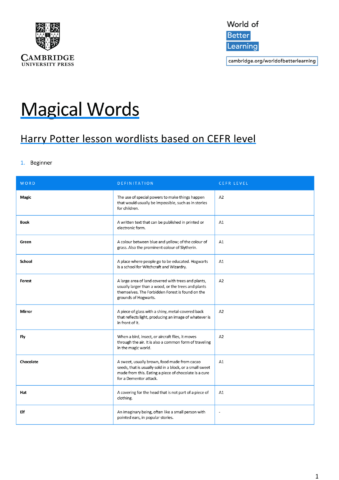As Harry Potter and the Cursed Child dominates book sales and the play entertains London audiences night after night, we examine the sources and humor of spell names in the entire Harry Potter series.
Wordplay is an essential part of the legendary success of the Harry Potter series of novels by J.K. Rowling and the current success of the play Harry Potter and the Cursed Child by Jack Thorne. This device is perhaps clearest in the names of the spells throughout the series, most of which incorporate forms of Latin roots. This is humor that is accessible to parents and that kids can grow into, as they grew up with the series itself.
Good examples of spells hiding Latin are the movement spells in The Prisoner of Azkaban:
Hermione whispered, «Mobiliarbus!» The Christmas tree beside their table rose a few inches off the ground, drifted sideways, and landed with a soft thump right in front of their table, hiding them from view.
This spell, which moves trees and only trees, incorporates part of the Latin for tree, arbor.
Later in the same novel, there is another movement spell:
He muttered, «Mobilcorpus.» As though invisible strings were tied to Snape’s wrists, neck and knees, he was pulled into a standing position, head still lolling unpleasantly, like a grotesque puppet.
Mobilcorpus, which moves people, contains the Latin for body, corpus.
There are also spells like Lumos (Latin Lumen, for a spell that produces light. Lumen can be found in English «illuminate»). Expelliarmus (Latin Expellere, «drive out, drive away» for a forceful spell which seeks to drive your opponent away) and Aguamenti (Latin Aqua or perhaps Spanish Agua for a spell that produces water), which further capitalize on foreign roots. In addition to Latin roots, there is at least one spell with a Greek source, Episkey, which fixes Harry’s broken nose in The Half-Blood Prince. This word is derived from Greek episkeu, which means «to repair.»
Two spells in particular, Orchideous and Riddikulus, have an extra layer of fun hidden within them. Orchideous is a spell that produces flowers, but with the name of the spell containing the word hideous, the result may not be such a nice looking bouquet. This kind of play-on-words is echoed in Harry Potter and the Cursed Child, when a character demonstrates the Engorgement spell (Engorgio!) and another character responds, «Consider me engorgimpressed.» The Riddikulus spell makes something frightening (a Boggart) into something funny or amusing to the caster of the spell- Boggarts are defeated by laughing at them, so you have to get «rid» of them by making them «riddikulus.»
Keeping track of what these spells are called and what they do can be complicated business, and it’s possible that even the author, J.K. Rowling, got a little confused. In Harry Potter and The Goblet of Fire, the following occurs:
«My elf has been stunned.» Diggory raised his own wand, pointed it at Winky, and said «Enervate!» Winky stirred feebly, Her great brown eyes opened.
This would suggest that the enervate spell revives creatures. The only problem is that enervate is a very bad name for a reviving spell, because the word enervate means to impair and is from a Latin word, enervare, that meant «to weaken», which is a popular meaning of the English word as well. No one is sure if this spell name was something Rowling did on purpose or whether it was an oversight, but to avoid this confusion, Rowling has since changed the name of this spell, which is also cast in Harry Potter and the Half-Blood Prince, to «rennervate», the name of the spell now meaning «to energize.»
This isn’t the only time a spell name source has been mysterious. The unlocking spell, Alohomora was said to be from the West African Sidiki dialect and mean «friendly to thieves.» The problem with this is that Sidiki is a West African name and what was probably meant was Sikidy, a form of divination practiced in Madagascar, off the coast of Africa. The Malagasy language spoken in Madagascar does have a word Alohamora used in Sikidy, which means, among other things, «favorable to thieves.»
When J.K. Rowling created the magical universe of Harry Potter, she obviously saw the task of naming things, like the spells, not as a burden, but as an opportunity to enrich the world and expand its reach. Harry Potter devotees can talk for days about what it «means» that there is Latin and other muggle languages sprinkled throughout the spell names. For a casual reader, a detail like that can open up a previously hidden door and confirm that there is so much more to discover in Rowling’s magical universe.
Presentation on theme: «Word Play in Harry Potter»— Presentation transcript:
1
Word Play in Harry Potter
Taren Donneaud Nathan
2
Main Characters Name Origins and Favorite Spells and Potions
3
Harry Potter Expelliarmus Expecto Patronum Favorite Spells
First Name: Harry Harry is JK Rowling’s favorite boys name. It is of Anglo-Saxon origin and means “power”. It is shared by the magician Harry Houdini. Last Name: Potter A name that JK Rowling has been fond of since childhood. Alludes to “Potter’s field”, a place where unclaimed bodies are buried, like those of orphaned children. Expelliarmus (Disarming Spell) — Latin combination of «expellere» meaning «to expel» and «arma» meaning «weapon or upper arm.“ Expecto Patronum (Spell used to conjure a Patronus) — In Latin, «expecto» is to «await, desire, or hope for» and «patronus» is «protector.» Hence, «to hope for a protector.» A Patronus is used to protect against a Dementor.
4
Associated Spell and Potions
Ron Weasley Felix Felicis Wingardium Leviosa Associated Spell and Potions Last Name: Weasley In Ireland, Weasels are considered unfortunate animals, which is a reference to the Weasleys being poor. Rowling has always been fond of weasels. Felix Felicis (Luck Potion) — «Felix» is Latin for «lucky, fortunate, or happy.» «Felicis» is derived from two Latin adjectives, one for «lucky» and one for «of the lucky.» It translates as «lucky of the lucky,» but seems more acceptable to write it as «luck of luck.» Could haves ties to the word «felicity» which means «extreme happiness.» Wingardium Leviosa (Levitation Charm) — «Wingardium» is a combination of the English word «wing» and the Latin word «arduus» meaning «steep.» «Leviosa» contains the Latin word «levare» meaning «ease, lift, or pick up».
5
Hermione Granger Alohomora Avis Oppugno Favorite Spells
First Name: Hermione Refers to the patron saint of high magic Means “well-born”, “earthly”, or “stone”. A character in Aeneid and A Winter’s Tale. Last Name: Granger May refer to the Granger movement to improve the lives of farmers, much like starting SPEW A granger is a very common person, like muggles Alohomora (Spell that opens locks) — Derived from the Hawaiian «Aloha» meaning «goodbye,» and the Latin word «mora,» meaning «obstacle.» Avis (Spell that Ollivander used to make birds fly out of Krum’s wand) — Latin for «bird.» Oppugno (Spell that makes conjured creatures attack on the command of the conjurer) — In Latin, means «I attack.»
6
Favorite Spell and Potion
Albus Dumbledore Sectumsempra Veritaserum Favorite Spell and Potion First Name: Albus Severe refers to “strict” or “cruel” which highlight his personality Mentioned in Mansfield Park a favorite novel of Rowling Last Name: Dumbledore A town in England Based on a person Rowling knew. Sectumsempra (Spell used to seriously cut another person) — In Latin, «sectum» means to «cut, wound, or amputate» and «sempra» is derived from the word «semper» meaning «always» or «at all times.» Hence, «to wound always or make a permanent wound.» Veritaserum (Truth Potion) — «Veritas» is Latin for «truth» and «serum» is a potion.
7
Favorite Spell and Potion
Severus Snape Sectumsempra Veritaserum Favorite Spell and Potion First Name: Severus Severe refers to “strict” or “cruel” which highlight his personality Mentioned in Mansfield Park a favorite novel of Rowling Last Name: Snape A town in England Based on a person Rowling knew. Sectumsempra (Spell used to seriously cut another person) — In Latin, «sectum» means to «cut, wound, or amputate» and «sempra» is derived from the word «semper» meaning «always» or «at all times.» Hence, «to wound always or make a permanent wound.» Veritaserum (Truth Potion) — «Veritas» is Latin for «truth» and «serum» is a potion.
8
Favorite Spell and Potion
Lord Voldemort Horcrux Morsmorde Favorite Spell and Potion Assumed Name: Lord Voldemort Refers to a dark wizard in medieval times named Voldemortist, meaning Lord of Evil In many European languages “mort” or “mord” means death or evil In French, “vol-de-mort” means flight from death. Horcrux — «Horcrux» when broken down in many languages means «outside the cross.» This is consistent with the very unholy nature of creating one, and why it is stricken from the pages in a lot of textbooks. «Crucis» means «pain or torture,» and «hor» is a shortened form of the noun «horreum,» which means «storehouse.» Thus, «tormenting storehouse.» A Horcrux is effectively a «storehouse» for the part of the soul that an individual destroys when killing someone. «Hor» can also remind readers of the words «horrible» and «horrid.» The English meaning for «crux» is «the critical feature or essence,» like the crux of an argument. Similar to the Latin translation, it then becomes understood as «essence storehouse.» Many consider the soul to be the essence of an individual. A «crux» is also defined as a «difficult puzzle,» so Horcruxes can then be seen as «horrible» or «tormenting puzzles.» In Egyptian mythology, Horus was the son of the god Osiris, who became the God of the Dead. Crux is also Latin for «cross.» If you combine these two words, you get the «cross of Horus,» also known as the «ankh» (a cross with a loop at the top). The ankh was the symbol of life. Thus, a Horcrux would ensure life. Morsmordre (Makes the Dark Mark appear in the sky) — Combination between «mors» (Latin for «death») and «mordere» (Latin for «to bite»). Death bite? No — Death Eater.
9
Unforgivable Curses Origins of the Unforgivable
In the wizarding world of Harry Potter, it sometimes seems like every word is a twist on another phrase, or comes from a Latin root.

The Harry Potter universe is complex and complicated, magical and wonderful, dark and sorrowful. The Wizarding World is both uniquely brilliant and still inspired by the ordinary world. Language and history, in particular, had a part in creating the world readers and viewers came to love.
And authors love playing with language and seeing what new and inventive ways they can translate and convey information. From the first book until the last, J.K Rowling scattered wordplay throughout her writing — the best known, of course, being that ‘Diagon Alley’ is a play on the word ‘diagonally’.
Grimmauld Place
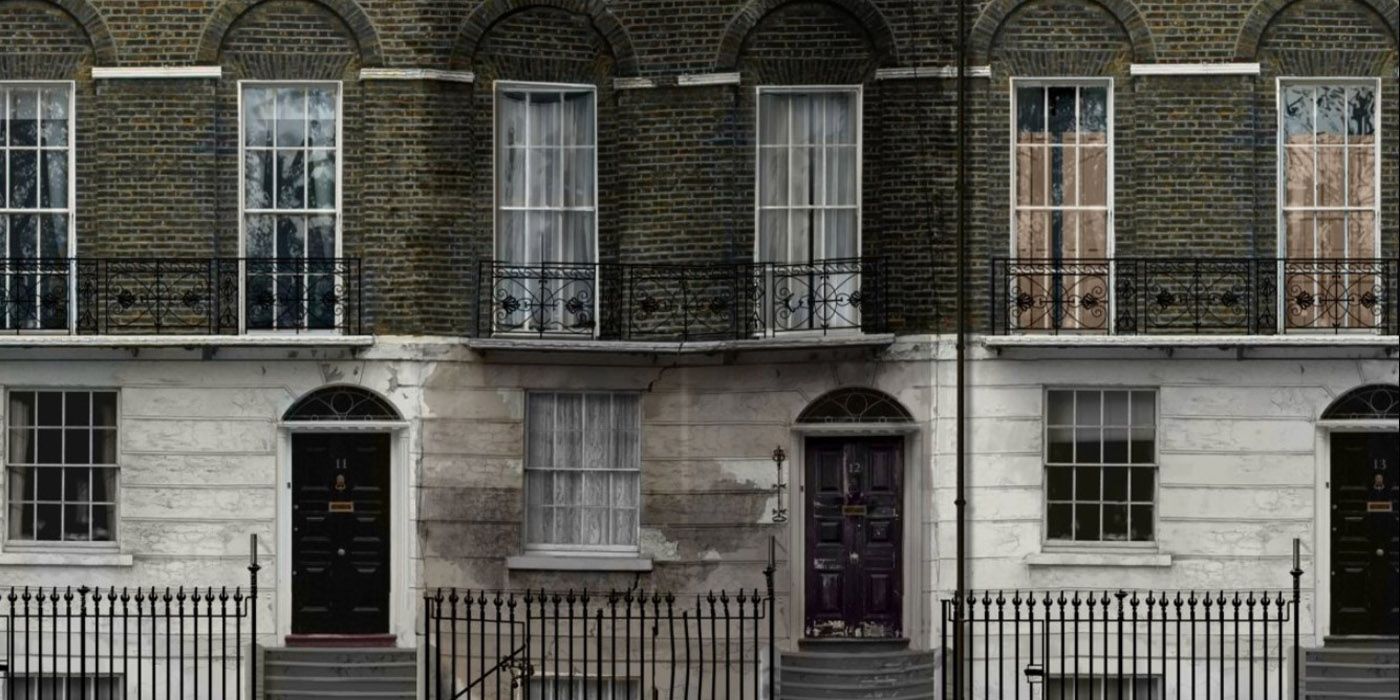
Number 12 Grimmauld Place is the Black family household. It was first introduced in Harry Potter and the Order of the Phoenix and continued to surprise fans with its interesting history. It was the home of Regulus Black, Sirius’s younger brother, and the person who found the Slytherin locket Horcrux.
It was where Harry, Ron, and Hermione hid for part of their Horcrux quest, and where Sirius Black was reminded of his ancestry. It was just as Rowling described it, a grim old place.
Knockturn Alley
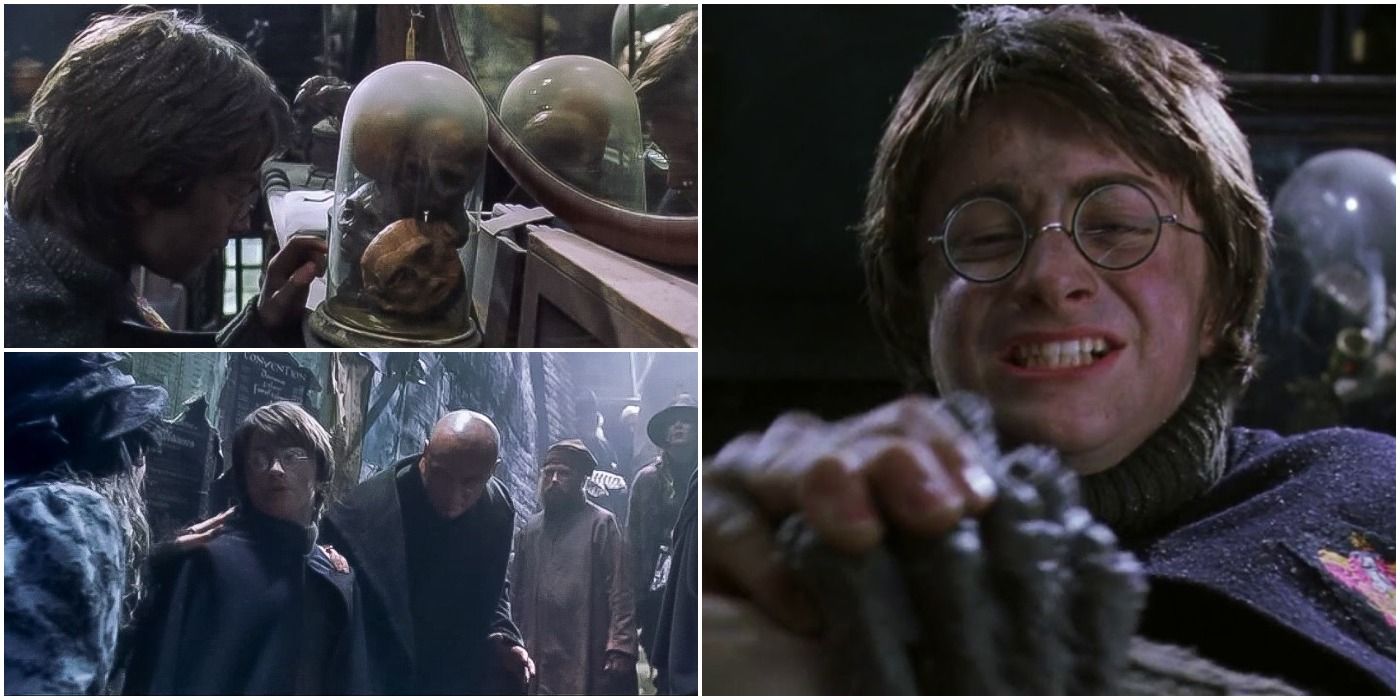
Just as Diagon Alley was named using the word diagonally, Knockturn Alley was named from the word nocturnally. Knockturn Alley is described by Hagrid as a «dodgy place,» as it is associated with many shops devoted to the Dark Arts — so it makes sense that it would be a play on ‘nocturnally’, as in ‘related to the night’ or ‘active at night’.
Potions & Their Translations
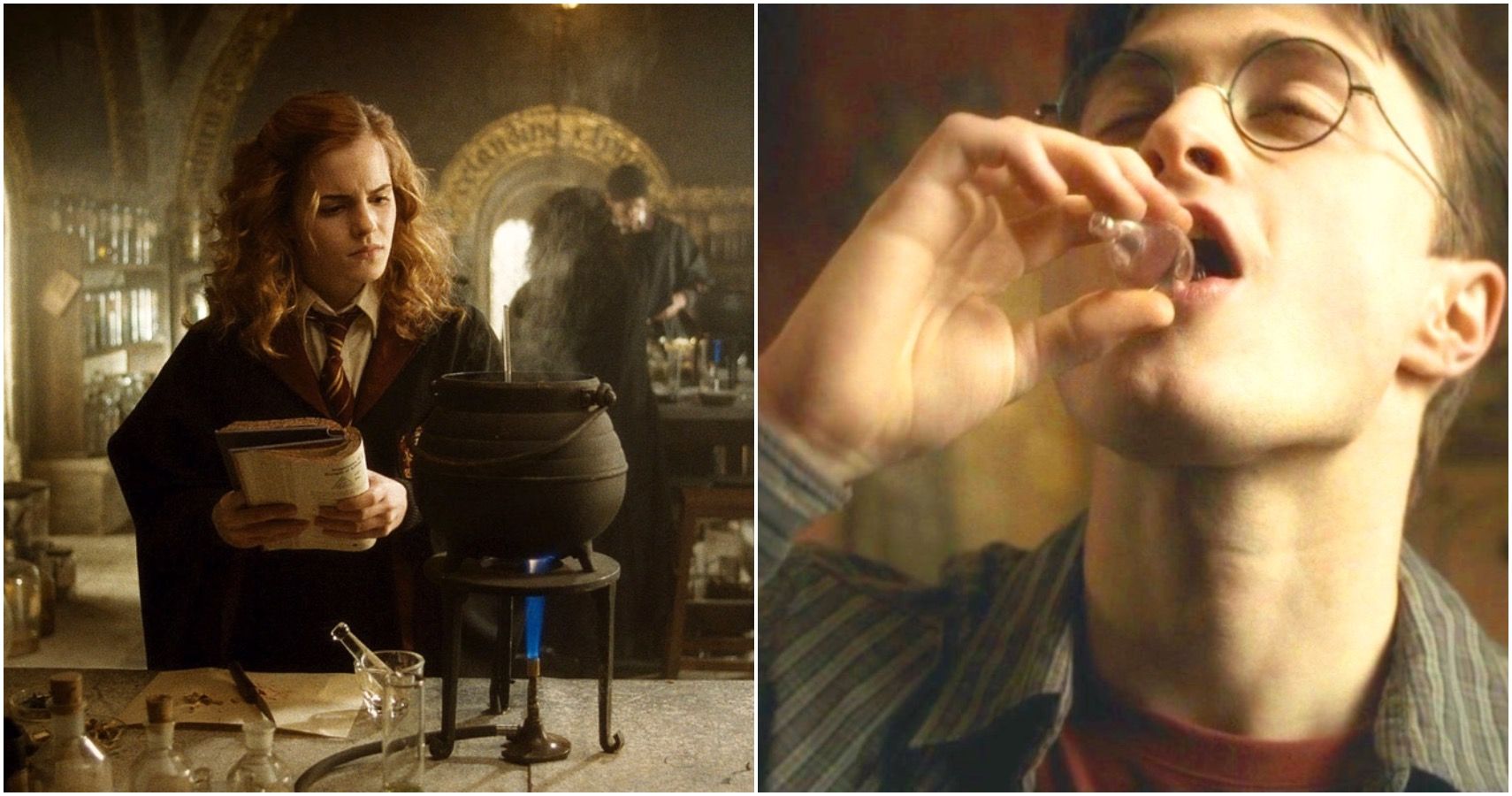
Potions are potent and delicate things. Snape tells his Potions students that potion-making is a «subtle science and exact art.» And most of the time, their names are a good indication of their purpose. «Veritaserum,» is a powerful truth serum with a name derived from Latin origins; «veritas,» translates to «truth,» and «serum» which is a common word, of course. The lucky potion that is «Felix Felicis» is made of two words meaning happy, lucky, prosperous, and variations thereof.
Sirius Black
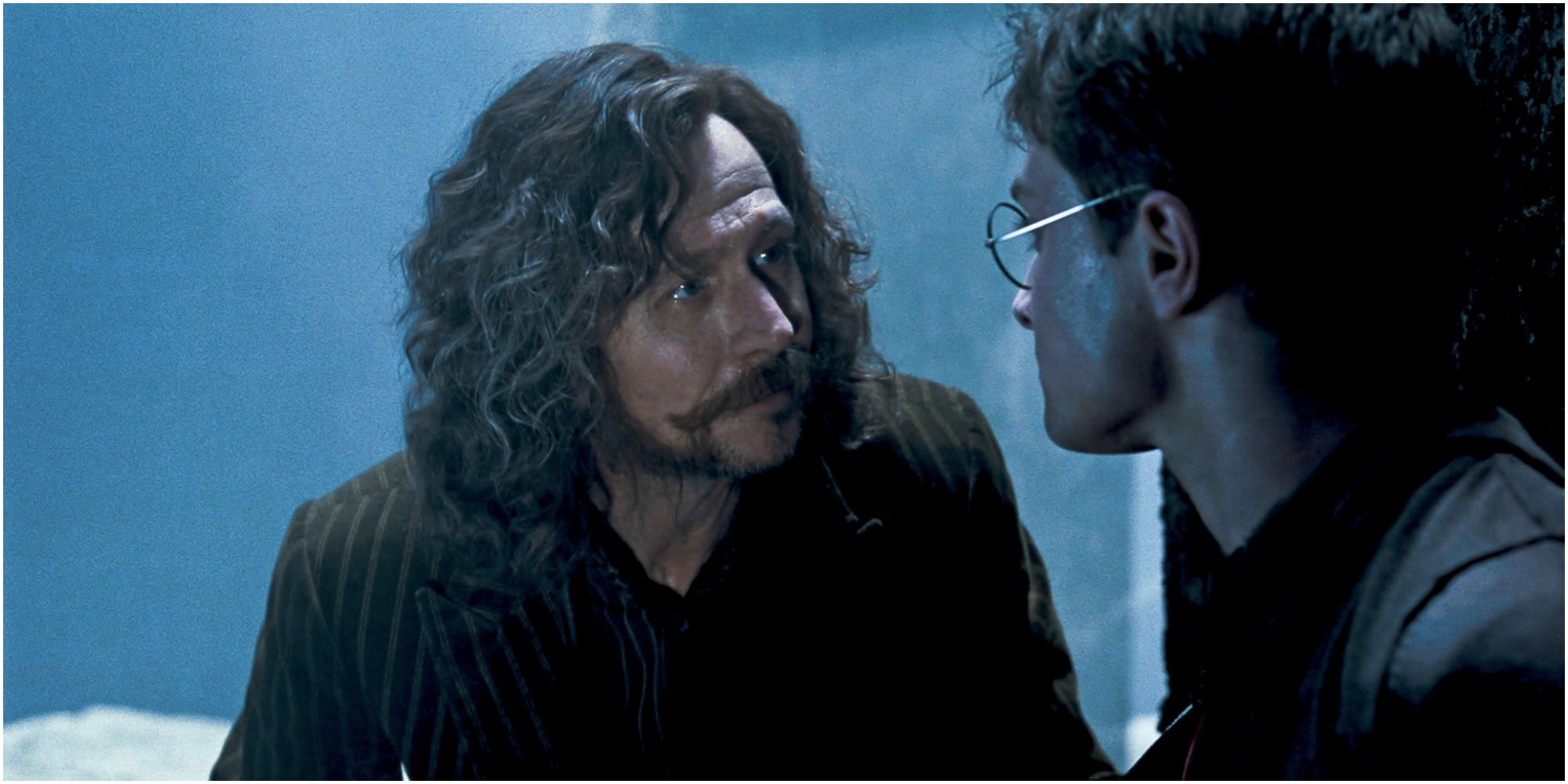
Sirius Black is an Animagus who takes the form of a black dog. His name reveals his Animagus form as «Sirius» is a star, in particular, it is the Dog Star or Alpha Canis Majoris in the Canis Major, Latin for «Great Dog» constellation. Sirius is known as being the brightest star in the night sky, which is quite fitting for the Black family member who despised his family and what they stood for.
Sirius dies when he falls through the veil between life and death, a connection to the Sirius star as it is believed to be the doorway of the afterlife and a path of souls. Most of the Black family names have connections to their story, predicting their temperaments, actions, and deaths.
The Knight Bus
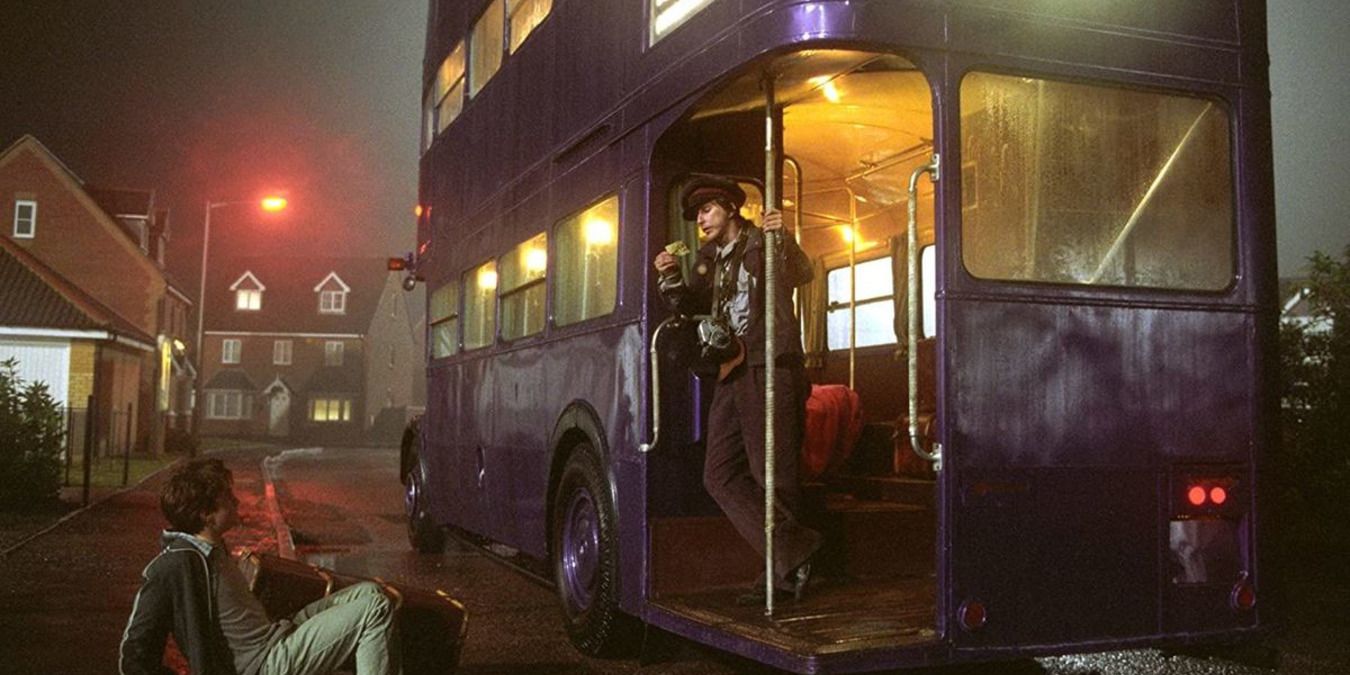
The Knight Bus is first introduced in Harry Potter and the Prisoner of Azkaban after Harry accidentally summons the magical vehicle during a fall. The Knight Bus comes to the aid of those who require it; those who need transportation other than Apparating, the Floo Network, Portkeys, or broomsticks. The words night and knight are homonyms, and a knight is someone who comes to the rescue, a savior.
Voldemort
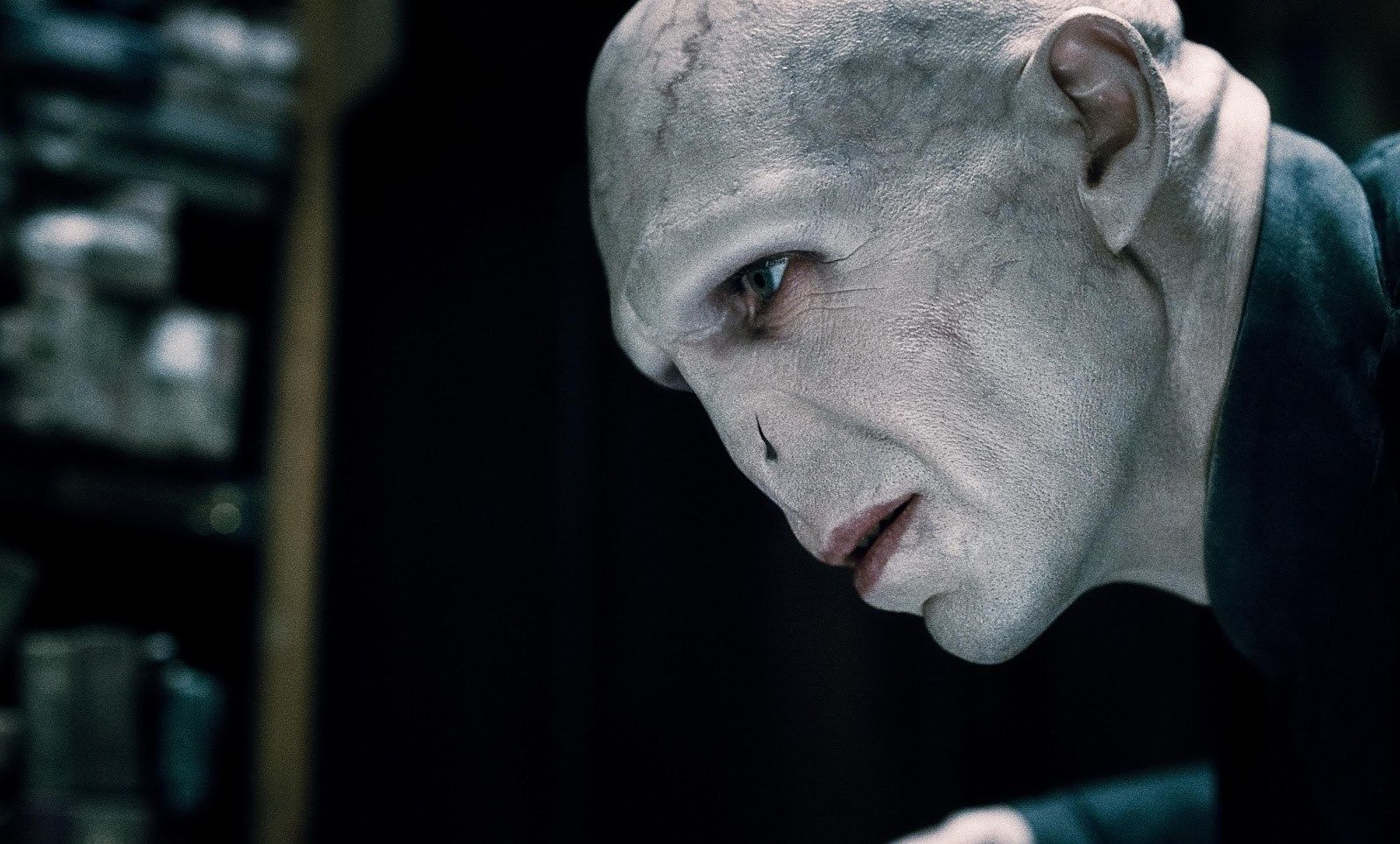
Voldemort is an anagram of the name Tom Marvolo Riddle, created by Tom Riddle himself. This name just happens to mean something significant other than being a random string of letters that coincidentally fit together. The name Voldemort can be broken into three sounded parts of French origin. The word «Vol,» meaning «flight» or «theft,» while «de» means «of» or «from,» and «mort» means «death.» Voldemort tried to elude death by making Horcruxes.
Snape’s Words To Harry
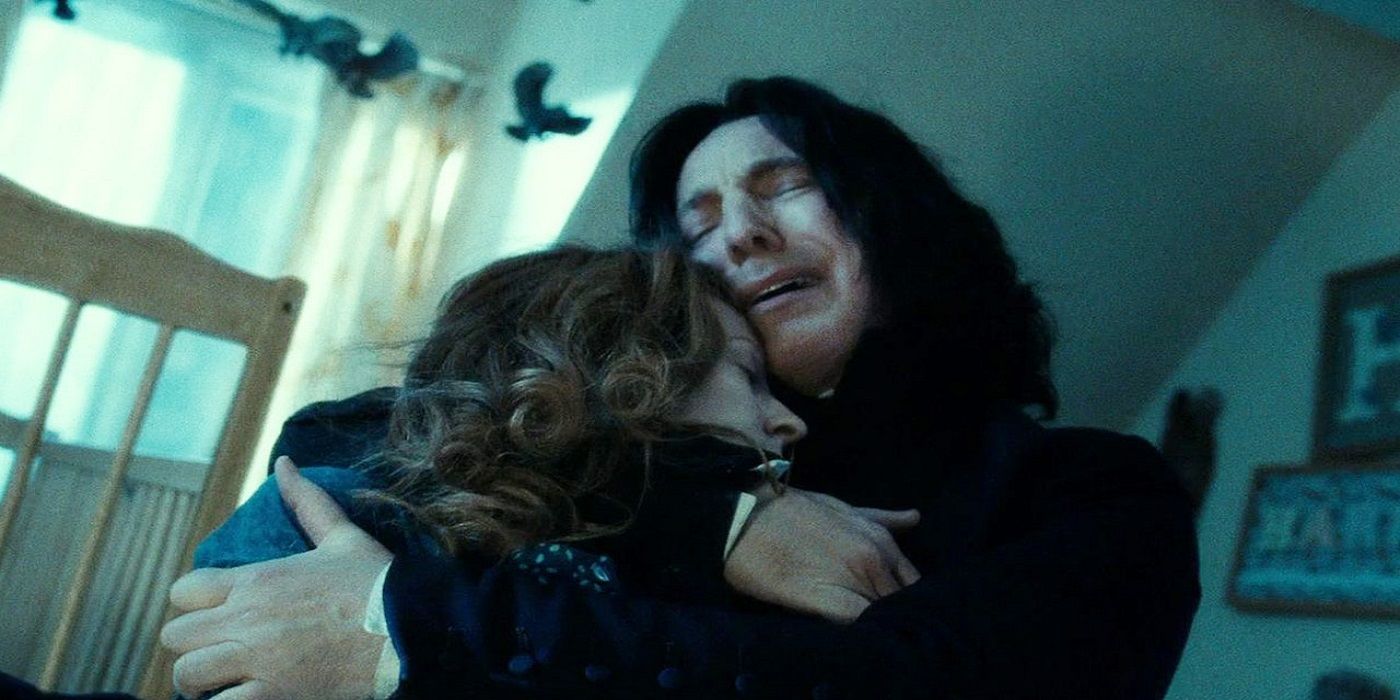
«Tell me, what would I get if I added powdered root of asphodel to an infusion of wormwood?» To most, these lines are a potion’s professor asking their student a question. But the real meaning of this question can be found by dissecting the meaning of the words. «Asphodel,» is a type of Lily whose flower translation is associated with remembrance beyond the grave, while wormwood is associated with bitterness and grief. Therefore, Snape’s first words to Harry are «my regrets follow you to the grave,» and that he bitterly regrets Lily’s death.
Mirror Of Erised
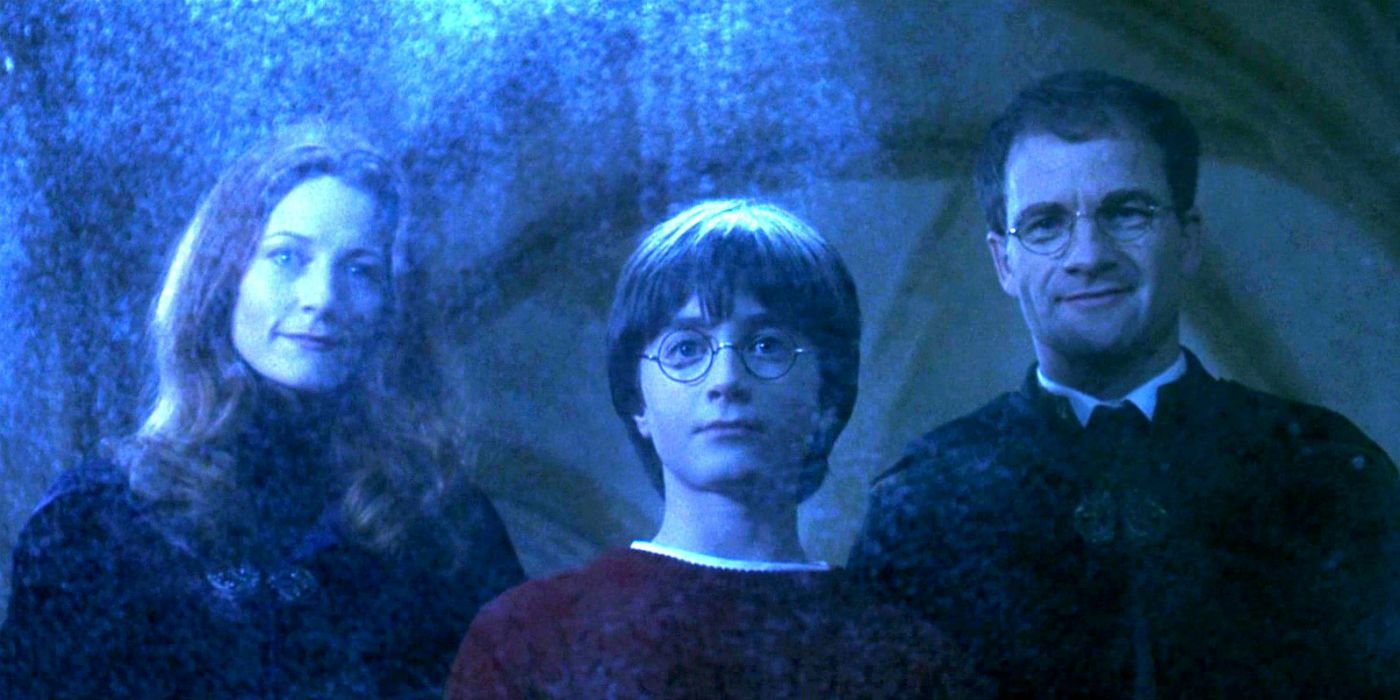
The Mirror of Erised is a magical artifact that shows the subject looking into the mirror their heart’s desire. The word «Erised,» is the word «Desire,» spelled backward.
The inscription engraved around The Mirror head also reads «Erised stra ehru oyt ube cafru oyt on wohsi.» Using mirror-writing, the engraving translates to «I show not your face but your heart’s desire.»
Spells & Their Translations

It’s no surprise that many of the spells in the Wizarding World have literal meanings for what they do, their names finding origin from magical, mystical sounding historic languages. The summoning charm «Accio» is of Latin origin meaning «I summon.» The spell that extinguishes light is «Nox,» meaning «night» in Latin. Harry’s much-loved spell of choice «Expelliarmus,» takes «expello,» which is Latin for «I banish,» and «arma» meaning «weapons.» The extremely difficult «Expecto Patronum,» takes the word «expecto,» meaning «I wait,» and «patronus,» meaning «protector/guardian.» The spell for water «Aquamenti,» is of «Aqua» meaning «water,» and «mentis» meaning «mind.»
Remus Lupin
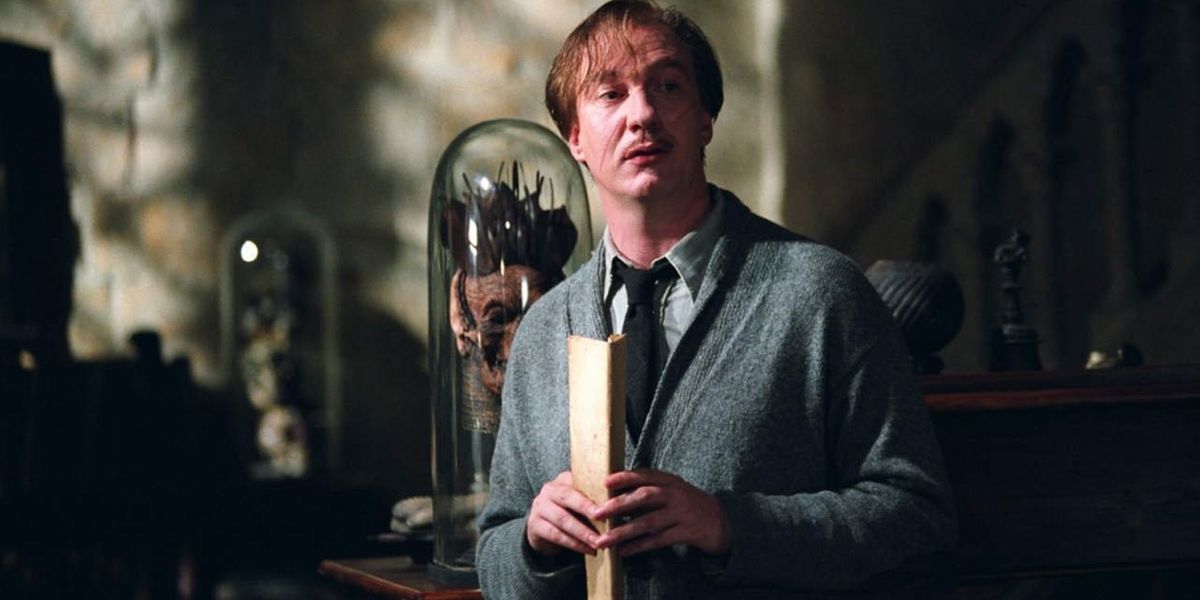
It’s hard to think that Lupin had this name before he became a werewolf, but Rowling wrote his destiny, and a werewolf was he to be. The name «Remus» finds its origins in the ancient Roman tale of Remus and Romulus, two brothers raised by wolves. Remus’s father’s name is Lyall, meaning «wolf,» in Norse roots, meaning Remus was raised by a wolf. The name «Lupin» is of Latin roots meaning «wolf.»
NEXT: Harry Potter: 10 Mistakes JK Rowling Made In The Chamber Of Secrets Book
-
Home
- »
-
Quizzes
- »
-
For Children Trivia
- »
-
Wordplay for Kids

TARRY, POTHER and enjoy playing quizzes with anagrams and other types of word play based on the Harry Potter books.
34 quizzes and 370
trivia questions.
1.
Find the names of characters from the Harry Potter books hidden in the sentences.
Average, 10 Qns, starz2000,
May 20 05
Average
starz2000
20347 plays
2.
I will give you a rhyme and you tell me which Harry Potter character I am describing. Enjoy!
Average, 10 Qns, goblinqueen18,
Aug 10 12
Average
goblinqueen18
13727 plays
3.
Figure out the missing word to form part of a rhyme using the clues below. For instance, «Potter’s school vehicles» are «Hogwarts transports». This quiz uses American pronunciations.
Easier, 10 Qns, stingjc,
Feb 24 07
Easier
stingjc
12337 plays
4.
While at Hogwarts, you and ten of your fellows play a game of Hide and Seek. You are the Seeker. Can you find your friends’ and teachers’ names in these sentences?
Average, 10 Qns, reeshy,
Nov 28 09
Average
reeshy
6884 plays
5.
In this quiz, unscramble the clues to find the name of a Gryffindor student from the Harry Potter series. Note the books go from Book One through to Book 6. Have fun!
Tough, 10 Qns, thegogga,
May 13 07
Tough
thegogga
11095 plays
6.
The words in capitals can be rearranged to spell the names of characters in the Harry Potter books.
Some of the other words give you a hint about the character. The number of letters in the names and some initials have been given to help you.
Tough, 10 Qns, minch,
Oct 07 06
Tough
minch
12274 plays
7.
This will be my fourth Harry Potter anagrams quiz. In this quiz, unscramble the words to get the names of either a teacher or a ghost. Note that the clues go from Book 1 through to Book 6, and no titles are used (e.g. «Professor.») Have fun!
Tough, 10 Qns, thegogga,
Sep 23 14
Tough
thegogga
8910 plays
8.
Figure out the missing word to form part of a rhyme using the clues below. For instance, «Potter’s school vehicles» are «Hogwarts transports». This quiz uses American pronunciations.
Average, 10 Qns, stingjc,
Jan 23 10
Average
stingjc
10765 plays
9.
Here are some very funny anagrams of a couple of Harry Potter characters. Mostly it’s first and last name; capitalize them. Good luck and enjoy the quiz!
Difficult, 10 Qns, PearlQ19,
May 13 07
Difficult
PearlQ19
15480 plays
10.
These are characters from the Harry Potter books. Use the capital letters to make the character’s name. (Not including people’s names and the first letter of the first word.)
Average, 10 Qns, pippinlover7,
Jul 25 07
Average
pippinlover7
11985 plays
11.
When I studied at Hogwarts, I invented the Removocali spell. It leaves the target deprived of all vowels. Can you decipher these students and teachers hit by the Removocali spell? All false options are fictitious. Warning: contains spoilers.
Very Easy, 10 Qns, JanIQ,
Dec 01 18
Very Easy
JanIQ
Dec 01 18
581 plays
12.
The words written in capitals can be anagrammed into characters in the Harry Potter books.
Very Difficult, 10 Qns, minch,
May 13 07
Very Difficult
minch
12401 plays
13.
This is my fifth installment of Harry Potter anagrams. I’ve had lots of fun creating these! In the clues, unscramble the letters to find the name of a miscellaneous (i.e. not at Hogwarts) character in the series, however minor they may be. Have fun!
Very Difficult, 10 Qns, thegogga,
Dec 16 13
Very Difficult
thegogga
5684 plays
14.
Unscramble the words below in order to make the name of places which appears in the Harry Potter books. Have fun!
Tough, 10 Qns, thegogga,
May 13 07
Tough
thegogga
5512 plays
15.
This quiz mixes knowledge of Harry Potter and other information. To get the whole answer, you mix the first and second answer, joined by a common word, eg: George Washington Irving, where the first is George Washington and the second is Washington Irving
Difficult, 10 Qns, CzarManx,
Feb 02 06
Difficult
CzarManx
11492 plays
16.
This is a quiz about Harry Potter anagrams. The two letters in the hint are initials and the numbers are the amount of letters in both names. Have fun and good luck!
Difficult, 15 Qns, Nick334,
May 13 07
Difficult
Nick334
10231 plays
17.
It’s been a while since I last did an «HP Anagrams» quiz, and I figured it would be nice to start thinking and doing another one. This one is on some of the miscellaneous characters that appear in the books. Have fun!
Difficult, 10 Qns, thegogga,
Jun 08 08
Difficult
thegogga
4063 plays
18.
Here are some of my favorite Harry Potter Characters in anagram form. Re-arrange the letters to discover the person’s name. Have Fun!
Average, 10 Qns, goblinqueen18,
May 27 07
Average
goblinqueen18
5614 plays
19.
These are the names of a few Harry Potter characters, but they are in anagram form. Try to solve them.
Impossible, 15 Qns, puklu,
Apr 10 09
Impossible
puklu
9281 plays
20.
Huller! The task is simple. Rearrange all the letters to form a character’s name in Harry Potter. Questions range through all six Harry Potter books. Good luck!
Tough, 15 Qns, dayday_mamac,
Nov 02 09
Tough
dayday_mamac
3133 plays
21.
In this quiz, you will be given a riddle, poem, limerick, etc. describing a Harry Potter character/thing/place/creature. It is based entirely on the books, NOT the movies. This quiz is brought to you by team Harry Potter Fans.
NOTE : Spoilers!
Average, 10 Qns, 123laura123,
Dec 24 11
Average
123laura123
1272 plays
22.
All you have to do here is find out which Harry Potter character matches the clues given. The clues pronounce the name. Remember, write the first letter of the name in a capital letter.
Average, 10 Qns, ananshenoy,
Sep 18 19
Average
ananshenoy
Sep 18 19
619 plays
23.
This is my third Harry Potter anagrams quiz. In this quiz, unscramble the letters to find the name of a Hogwarts student (no Gryffindors, though.) I used Book 1 through to Book 6. Have fun!
Very Difficult, 10 Qns, thegogga,
May 13 07
Very Difficult
thegogga
2350 plays
24.
I’ve used the «Removocali» spell once again — which removes every vowel. Can you restore the vowels in the following spells? Don’t look for the «Removocali» spell in the books — I’ve invented it in my last year at Hogwarts.
Average, 10 Qns, JanIQ,
Nov 28 19
Average
JanIQ
Nov 28 19
231 plays
25.
Here’s a quiz featuring characters from Harry Potter, but with fractured words. You have to sound out the clues in order to come up with the character. For example: «Hare reap out err» = Harry Potter. Have fun and good luck!
Average, 10 Qns, Jordanar18,
Jan 01 19
Average
Jordanar18
Jan 01 19
189 plays
26.
Swimming around in Albus Dumbledore’s pensieve are some words concerning Hogwarts, people and magical things. Can you pick them out from the letters that swirl around them?
Easier, 10 Qns, CmdrK,
Dec 22 13
Recommended for grades: 8,9,10
Easier
CmdrK
493 plays
27.
Oh no! Seamus messed up another spell and now everybody has turned into words in textbooks! Find them and enter their names into the boxes before the spell becomes permanent!
Average, 10 Qns, MarkThames,
May 17 15
Average
MarkThames
319 plays
28.
How well do you know your Harry Potter Anagrams? Hi everyone! This quiz is created by the Harry Potter fans team. Let’s see how well you know your Harry Potter characters, in Anagram form. Hope you enjoy it!
Difficult, 15 Qns, NessieR,
Apr 13 10
Difficult
NessieR
736 plays
29.
This is a quiz on anagrams of some minor characters in the Harry Potter books. Have fun 
Difficult, 15 Qns, edsrat,
Jun 25 04
Difficult
edsrat
3595 plays
30.
Can you find the HP folk from the fab J.K.Rowling series? Have fun and good luck!
Average, 10 Qns, oneof5,
Dec 09 10
Average
oneof5
1033 plays
31.
Each question contains clues to help you guess the Harry Potter word. Answers include characters, every day wizard items, places, and more!
Tough, 10 Qns, SnowAngel16,
Jun 01 15
Tough
SnowAngel16
776 plays
32.
Hey everyone. If you love JK ROwling’s Harry Potter, then this is the place for you to test how much you know about it. Let’s see if you can figure out what these words stand for in the series. Good Luck!
Difficult, 10 Qns, NessieR,
Mar 13 10
Difficult
NessieR
601 plays
33.
You have to find the name of some «Harry Potter» characters in the given sentences.
For example: I saw someone taking the bag manager. The given name is Bagman (Ludo Bagman). Remember that commas don’t matter.
Hope you will have fun. Enjoy!
Average, 10 Qns, princess_tiana,
Oct 23 17
Average
princess_tiana
Oct 23 17
231 plays
34.
This quiz is based on the «Harry Potter» books by J.K. Rowling. Try to guess which minor character’s name is hidden in each of the following scrambled words. Good luck!
Impossible, 15 Qns, LilyE,
Jan 04 12
Impossible
LilyE
1046 plays
This is category 12090
Last Updated Apr 08 2023 5:49 AM




=
added recently, = Editor’s Pick
= FunTrivia Editor
= Gold Member
Teachers / educators
: FunTrivia welcomes the use of our website and quizzes in the classroom as a teaching aid or for preparing and testing students. See our education section. Our quizzes are printable and may be used as question sheets by k-12 teachers, parents, and home schoolers.
· All questions, answers, and quiz content on this website is copyright FunTrivia, Inc and may not be reproduced without permission. Any images from TV shows and movies are copyright their studios, and are being used under «fair use» for commentary and education.
Harry Potter has contributed considerably to modern culture in the English speaking world – but what about its impact on the English language? Resident language researcher Matt Norton takes a look using data from the Cambridge English Corpus and the Spoken British National Corpus.
Probably everybody has heard of Harry Potter. Most will also know some of the memorable words that feature in both the book and the film series. Certainly J.K. Rowling has contributed a number of new words to the English language as it is written and spoken today – there are hundreds of distinctively Potter-esque words that feature in the series.
In order to investigate the impact this has had on modern English, we can use the Cambridge English Corpus (CEC) – a multi-billion word collection of contemporary spoken and written English and our most current collection of spoken British English (the Spoken British National Corpus). Both contain many Harry Potter words, some used quite frequent and some fairly rarely. In this article I use corpus linguistics to examine how the world of Harry Potter – or the ‘Potterverse’ – has influenced English with new words invented by Rowling (“coinings”); her reusing of rare or obscure words; and changes to existing word usage.
J.K Rowling’s use of language in the Harry Potter series
The Potter series shows a clear love of language. For example, we can see this by looking at the word-play involved in blend words – words made up from fusing two words together. Examples in Harry Potter include words like ‘animagus’, a blend of animal and magus (a kind of wizard, plural magi), and ‘merpeople’, blending from mer(maid) and people. Some of the words sound like parodies of English words, like ‘Hogwarts’, the name of Harry’s ‘School of Witchcraft and Wizardry‘, ‘Hufflepuff’ house or the game ‘Quidditch’. Although ‘Hogwarts’ sounds like a combination of hog and wart, there is also a plant called hogwort, which is a genuine English word, which may have also influenced this creation. So it seems that the English language may have already contained ‘otterisms before Potter, but they were obscure or “hidden”, a bit like how the magical world is hidden from humans in the Harry Potter series!
Rowling often uses imitation Latin, also known as dog Latin, especially in the spells or charms, such as ‘Expelliarmus’, the defense spell; ‘Expecto Patronum, to protect against dementors; and ‘Finite Incantatem’ (end the spell). The magical object ‘Horcrux’ has a dark, occult-like tone and appears to be a blend of horror (or similar Latin word) and Latin crux meaning cross.
Words invented by J.K. Rowling
J.K. Rowling invented numerous words across the series – examples of the most frequent of these new Harry Potter words as found in the Cambridge English Corpus are shown in table below. What’s interesting to note here, is that often these words are used in context beyond talking about the Harry Potter books or films. In these cases the meaning of a word has been extended and applied to the real world. Lots of examples of this were found in the collection of spoken conversations (the Spoken BNC).
| Table 1. Most frequent Harry Potter words found in the Cambridge English Corpus |
|||
| Word | Meaning | Example | |
| 1 | Hogwarts | Harry’s school | Hogwarts, by contrast with previous boarding school stories, is “socially inclusive” and “multicultural”. |
| 2 | Voldemort | Evil powerful character, unspeakable name | In March 1940, in the “midnight of the century” that marked the depth of the Hitler-Stalin pact (or in other words, at a time when civilization was menaced by an alliance between two Voldemorts or “You-Know-Whos”), George Orwell took the time to examine the state of affairs in fantasy fiction for young people. |
| 3 | Azkaban | High security magical prison | Oh dear it’s off to Azkaban with you – and time to swap your wizard’s cap for a dunce’s hat. |
| 4 | Quidditch | Game played on broomsticks | So it’s appropriate that the Quidditch Fund, run by management trainer [name] from Brighton, has snatched the prize and become the first leader in the Guardian/Bernardo’s Investment Challenge |
| 4 | muggle | Non-magical human | My muggle husband and sister came along to your talk and are no longer making fun of the knitting. |
| 5 | Gryffindor | Harry’s house at Hogwarts | It’s the casting of three children – Harry and his Gryffindor House co-conspirators Ron and Hermione – that is the movie’s greatest coup. |
| 6 | Slytherin | Antagonistic house at Hogwarts | … one of the biggest Harry Potter fan sites featuring a Slytherin reptile house … |
| 7 | Diagon Alley | Magical shopping street | Then we get a visit to Diagon Alley, a hidden street in London where witches and wizards shop for this year’s school supplies. |
| 8 | Hogsmeade | Village where Hogwarts is | The Hogwarts Express arrives at Hogsmeade Station. |
| 9 | Portkey | An object used to transport people | She settled on his shoulder and he grabbed the Portkey. |
| 10 | Horcrux | Part of the soul stored in an object | … mine contain purple liquid and do not contain the souls of deceased persons, although I would not deny the possibility of something not dissimilar to a Horcrux being involved, or not. |
| 11 | Butterbeer | Drink preferred by young wizards | Tourists will also be able to buy Butterbeer from Hogshead Tavern. |
| 11 | Hufflepuff | A house in Hogwarts | When Mr Blunkett “passed” on the emblem of Hufflefpuff, it was merely confirmation that he is still fit for the top job in the Home Office. |
| 12 | Patronus | Charm | Wizards defend themselves against Dementors with a Patronus charm, and Potter conjures a glowing white stag to chase them off. |
| 13 | Whomping Willow | Violent tree | Harry Potter’s new book came out and Marcus Trescothick’s whomping willow pulled off a pulsating triumph for England. |
| 14 | Quaffle | A large red ball used in Quidditch | They try to get the Quaffle through a hoop in order to score a goal. |
| 15 | Sorting Hat | Talking hat which puts pupils in a house at Hogwarts | At Case, for instance, incoming freshmen are given a writing placement test that has come to be known as the “Sorting Hat”, a reference to a fixture in Rowling’s fictional boarding school. |
| 16 | Floo powder | Powder used to travel using fireplaces | The wizard grabs a handful of floo powder out of a container near the fireplace. |
| 17 | Parseltongue | Language of the snakes, whispered with a lot of S. | A quick Parseltongue incantation and Dorjan’s eyes slid shut. |
| 18 | Expelliarmus | Defensive spell | You will be forced to use your Expelliarmus almost instantly. |
| 19 | mudblood | Human with wizard abilities | (see above for example) |
| 20 | animagus | Person who can turn into an animal | Animagi, elves, ogres, genies, aliens and … Kramer – what a magial week! |
Hogwarts is the most popular newly-invented Harry Potter word in the data. It can be used to refer to large, old, dramatic buildings which have an appearance similar to Hogwarts, such as some of the older Cambridge University colleges. It can also be used to refer to university in general, e.g. in this example:
A: “It’s was so nice to be back at Uni again, you know?”
B: “Oh yeah I forgot, how are things going at Hogwarts?”
Aside from Hogwarts, Voldemort is the next most frequent coining in the Cambridge English Corpus. His name can represent a great evil power who may be so bad that his name cannot be uttered. In our data, we also see it used to refer to very bad people in general, e.g. dictators or warlords:
“…in the “midnight of the century” that marked the depth of the Hitler-Stalin pact (or in other words … an alliance between two Voldemorts or “You-Know-Whos)”
This new word also gives rise to Voldemortesque, Voldemortish and similar compounds. The name Voldemort seems to come from the French words “vol de mort” or “flight of death” or possibly “theft of death”.
Mudblood is a word often used by malevolent characters to refer to part-human part-magical people. In the example shown below, this term is used in non-Potter contexts to refer to a person of mixed geographical heritage:
A: “So what am I? Born in Essex but I‘ve got a Geordie mother and a Scottish dad, so what does that make me?”
B: “Oh it’s a, that’s a foreign country Essex.”
A: “Am I a mudblood?”
The word ‘muggle‘ is used in the book to mean humans, i.e. people who don’t have magical powers. Because wizards see muggles as somewhat lacking in skill or knowledge, the term ‘muggle’ has now come to mean someone who is not very skilled at something, in a more general sense. In the Cambridge English Corpus we see examples such as this one referring to people who don’t have skills in a particular area:
“My muggle husband and sister came along to your talk and are no longer making fun of the knitting.”
Harry Potter has contributed considerably to modern culture in the English speaking world. For example, in the Spoken BNC there is reference to a Harry Potter themed club night, and to speakers wanting to do a university degree in the science of Harry Potter. The term Harry Potter has 18.9 instances per million in the new Spoken BNC, beating other seemingly common English words such as ‘marriage’ with 15.5 and ‘magic’ with 16.81. The English language now also contains words such as ‘Potterdom’ (the fandom or sphere of Harry Potter), ‘Potterfic’ (Harry Potter fiction), ‘Potterhead’/’Potterholic’/’Pottermaniac’ (a fan of Harry Potter), ‘Potterian’ (relating to Harry Potter), and ‘Potterverse’ (the world in the Harry Potter series).
Words reused or repopularized by the Harry Potter books
By looking at how frequent Potter-esque words were both before and after Harry Potter was published, we can see how language has changed. The results of this can be seen below.
| Table 2. Changes over time to Harry Potter related words in the Cambridge English Corpus |
||||
| Word | Non or pre-Potter meaning | Potter meaning | Change | Frequency |
| mandrake | Plant with hallucinogenic properties, human-like roots, associated with magic and myth | Same but magical, can move and scream | UP | 812 |
| squib | Various meanings to do with weak explosion | Non-magical person born to wizards | UP | 793 |
| bludger | Obsolete: freeloader | A type of ball in Quidditch | UP | 334 |
| muggle | (not used or only word play) | Non-magical human | UP | 263 |
| dementor | Person who makes crazy | Monster that sucks people’s souls | UP | 105 |
| mandragora | The mandrake genus | Same | DOWN | 33 |
| hippogriff | Half-griffin, half-horse | Same | SAME | 30 |
| apparate, disapparate | Appear or disappear | Magically appear or disappear | UP | 25 |
‘Dementor‘ is an old Latin word meaning ‘one who makes crazy or dements‘. It has been revived by Rowling (though with a specific sense of a kind of soul-sucking monster), and its use sharply increases in the nineties. Again, we frequently see this word used in the Cambridge English Corpus in a non-Harry Potter sense:
“I called my kid a Dementor. Bad Mama! A gorgeous sweet friendly Dementor, who laughs at rolling soccer balls and squirty bath toys, but still.”
Squib is a strange English word. Its origin is apparently an imitation of a not very impressive explosion e.g. made by a firework and we have the term damp squib, meaning disappointment. There are actually many senses of this word though not often used. In Harry Potter a squib is a wizard born without magical powers, something very rare, much less common than the opposite ‘mudblood’. Use of ‘squib’ declines over the 20th century but the CEC shows it increases after Potter. Apparate (and its opposite disapparate) are words reused by Rowling to mean make oneself appear or disappear – magically of course. Bludger occurs only once in the corpus before Potter (“He was the cheekiest little bludger you’ve ever seen in your life”). Although it seems to have some obscure senses, mainly Australian slang for freeloader, it has over 300 occurrences so this could be a big increase in use due to Potter.
It’s clear that the language used in Harry Potter has changed the English Language, with many Harry Potter terms now used more widely by many speakers. How could you use Harry Potter words in your lessons? Download our suggested magical Harry Potter themed wordlists for beginner, intermediate and advanced learners, and let us know how you use them!
For more magical ideas for the classroom, take a look at Robert Dobie’s article on how to use the Harry Potter books or films for grammar practice.
Get teaching tips, insights, and resources straight to your inbox when you create your free World of Better Learning account today.




